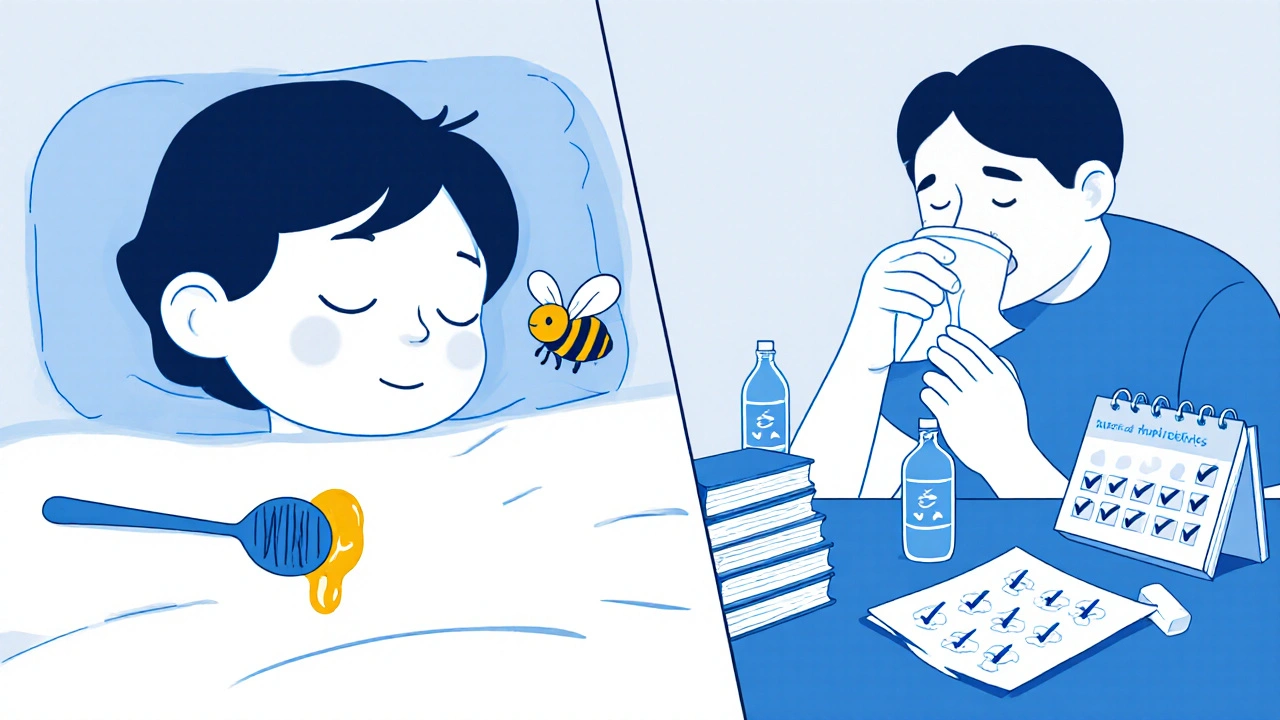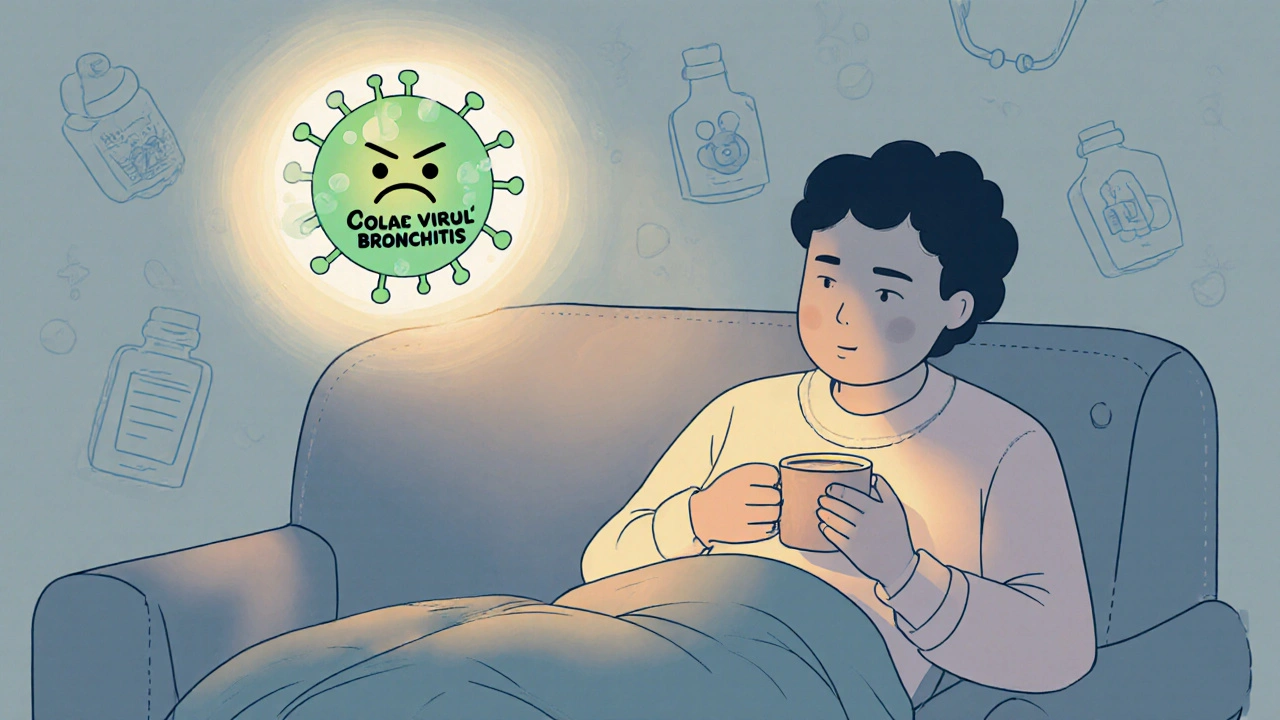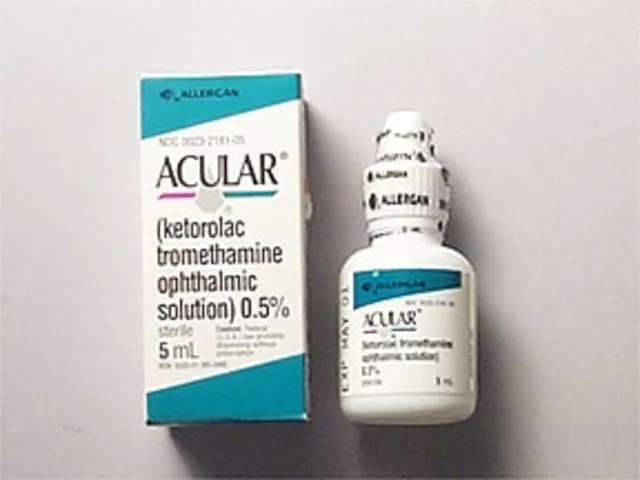Most people think a bad cough means they need antibiotics. You feel tired, your chest is tight, and you’ve been coughing for days-so you head to the doctor hoping for a prescription. But here’s the truth: acute bronchitis is almost always caused by a virus, and antibiotics won’t fix it. Not even a little. In fact, taking them when you don’t need them does more harm than good.
What Acute Bronchitis Really Is
Acute bronchitis is an inflammation of the bronchial tubes-the airways that carry air to your lungs. It starts with a cold or flu virus, and the main symptom is a cough that can last for weeks. You might cough up clear, white, or yellow mucus. Sometimes you feel a little feverish or have a sore throat. But if you don’t have a high fever, fast breathing, or sharp chest pain, you likely don’t have pneumonia. That’s key.
The cough is the body’s way of clearing out the irritation. It’s not a sign that bacteria are taking over. In fact, 90 to 95% of cases are viral. That means your immune system is the only thing that will make you better. Antibiotics target bacteria, not viruses. Giving them for a viral infection is like using a hammer to fix a leaky faucet.
How Long Does the Cough Last?
Most people expect to feel better in a few days. But with acute bronchitis, the cough sticks around. About half of people are still coughing after 10 days. A quarter are coughing after two weeks. And 1 in 10 are still coughing at three weeks. That’s normal. It doesn’t mean the infection is getting worse. It just means your airways are slow to heal.
A 2013 study found the average cough lasts 17.8 days. That’s longer than most people think. If your doctor says you should be over it in a week, they’re not giving you the full picture. Setting realistic expectations is one of the most important parts of care.
Why Antibiotics Don’t Work (and What They Do to You)
Let’s get straight to the numbers. A major Cochrane review looked at 9 clinical trials with over 5,600 patients. It found that antibiotics reduced cough duration by just 0.6 days-less than half a day. That’s not meaningful. Not when you’re dealing with a cough that lasts two weeks.
But here’s the cost: antibiotics cause side effects in 1 out of every 14 people. Nausea, diarrhea, rashes, yeast infections. And every time you take them unnecessarily, you increase your risk of antibiotic-resistant infections later. The CDC says 46 million unnecessary antibiotic prescriptions are given each year for respiratory infections like bronchitis. That’s a huge part of why superbugs are growing.
Studies show that even though guidelines have been clear since 2001, nearly half of all patients with acute bronchitis still get antibiotics. In some parts of the U.S., the rate is over 75%. That’s not because doctors don’t know better-it’s because patients expect them. And it’s hard to say no when someone’s coughing all night.

What Actually Helps: Evidence-Based Cough Care
If antibiotics won’t help, what will? The answer is simple: time, hydration, rest, and smart symptom relief.
- Drink fluids. At least 8-10 glasses of water a day. Thinner mucus is easier to clear. Warm tea or broth helps soothe your throat too.
- Rest. Your body needs energy to fight the virus. Don’t push through work or exercise. Sleep is medicine here.
- Use a humidifier. Cool-mist humidifiers add moisture to dry air and can ease coughing, especially at night. Clean it daily to avoid mold.
- Try honey. For adults and kids over 1 year old, 1-2 teaspoons of honey before bed can reduce nighttime coughing better than many over-the-counter cough syrups. A 2018 study in JAMA Pediatrics showed honey worked as well as dextromethorphan in children-with no side effects.
- Use dextromethorphan if needed. For adults, 15-30 mg every 6-8 hours (max 120 mg/day) can help suppress cough. But it’s not magic. It just makes it a little easier to sleep.
- Take pain relievers. Ibuprofen or acetaminophen can help with body aches or low-grade fever. Don’t exceed 3,000 mg of acetaminophen a day.
Stay away from codeine or hydrocodone cough medicines. The FDA banned them for kids under 12 because of serious breathing risks. Even for adults, they’re rarely needed and can cause drowsiness or dependency.
When to Worry: Red Flags
Most cases of acute bronchitis clear up on their own. But if any of these happen, see a doctor:
- Fever over 38.3°C (101°F) that lasts more than a few days
- Coughing up blood
- Shortness of breath or wheezing that gets worse
- Cough lasting more than 3 weeks without improvement
- Weight loss, night sweats, or extreme fatigue
These could signal pneumonia, asthma flare-ups, or something else. Don’t ignore them. But if you’re just coughing, feeling tired, and getting a little better each day-you’re probably on the right track.

How Doctors Are Changing the Game
More doctors are now using a technique called “delayed prescribing.” Instead of giving you antibiotics right away, they hand you a prescription and say: “Wait 48 to 72 hours. If you’re not better, or if you get worse, call back and pick it up.”
This works. Studies show it cuts antibiotic use by over 50% without making patients sicker. It also helps patients understand that waiting isn’t neglect-it’s science.
Some clinics now use simple tools: a 5-question survey that asks patients what they expect from the visit. Those who say they want “something to stop the cough” are more likely to accept non-antibiotic advice. That’s how behavior changes.
What’s Next? Research on the Horizon
Scientists are looking for better ways to treat coughs without drugs. One promising study, the BREATHE trial, is testing ivy leaf extract-a natural remedy used in Europe-for its ability to reduce cough severity. Early results are encouraging.
Another goal: finding a simple test to tell if a cough is viral or bacterial. Right now, it’s all guesswork based on symptoms. If we had a quick blood or breath test, we could stop guessing-and stop giving antibiotics to people who don’t need them.
The American Academy of Family Physicians has set a target: reduce inappropriate antibiotic prescribing for acute bronchitis to under 20% by 2026. That’s ambitious. But it’s possible-if patients and doctors work together.
Final Takeaway: Your Cough Isn’t Broken
You’re not weak because you’re still coughing after two weeks. You’re not failing because you didn’t get an antibiotic. Your body is doing exactly what it’s supposed to do: healing. Antibiotics won’t speed that up. But rest, fluids, honey, and patience will.
Next time you have a cough that won’t quit, remember: you don’t need a pill to fix a virus. You need time. And you deserve to be told the truth.
Can acute bronchitis turn into pneumonia?
Acute bronchitis doesn’t usually turn into pneumonia, but the two can be confused. Pneumonia is a deeper lung infection that often comes with high fever, rapid breathing, and chest pain. If your symptoms get worse after a few days-especially if you develop a fever over 38.3°C or trouble breathing-you should see a doctor. A chest X-ray can tell the difference.
Is it safe to give honey to a child with a cough?
Yes, for children over 1 year old. Honey is a safe and effective cough suppressant for kids. Give 2.5-10 mL (half to two teaspoons) before bed. But never give honey to babies under 1 year. It can cause infant botulism, a rare but serious illness.
Why do doctors still prescribe antibiotics for bronchitis?
Many doctors know antibiotics don’t help, but they feel pressure from patients who expect them. Some are worried about being accused of not doing enough. Others don’t have time to explain the science. It’s a system problem-not a personal one. Patient education and delayed prescriptions are helping change this.
Does guaifenesin (Mucinex) help with bronchitis cough?
The evidence is mixed. Some studies show guaifenesin helps thin mucus and ease coughing. Others show no real benefit. It’s not harmful, but don’t expect miracles. Staying hydrated works better and costs less. If you try it, stick to the recommended dose and don’t combine it with other cough medicines.
Should I use an inhaler if I have bronchitis?
Only if you’re wheezing. About 30-40% of people with acute bronchitis develop temporary wheezing due to airway irritation. In those cases, an inhaler like albuterol can help open the airways. But if you’re just coughing without wheezing, inhalers won’t help-and can cause shakiness, fast heartbeat, or nervousness.
How can I prevent acute bronchitis?
Wash your hands often, avoid close contact with sick people, and get your annual flu shot. Since most cases start with a cold or flu, preventing those reduces your risk. Don’t smoke, and avoid secondhand smoke-irritants make your airways more vulnerable to infection.







November 18, 2025 AT 09:06
I had bronchitis last winter and was shocked how long the cough lasted. Thought I was dying. Turns out? Normal. Honey at night saved my sleep. No antibiotics needed.